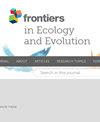Frontiers | Urban Green Infrastructure: Bridging Biodiversity Conservation and Sustainable Urban Development Through Adaptive Management Approach
IF 2.4
3区 环境科学与生态学
Q2 ECOLOGY
引用次数: 0
Abstract
Urban green infrastructure (UGI) is pivotal in reconciling biodiversity conservation with sustainable urban development through adaptive management approaches. This paper introduces a comprehensive conceptual framework integrating ecological principles, urban planning strategies, and adaptive management methodologies to nurture resilient and biodiverse urban landscapes. The essence of UGI lies in its capacity to bolster ecological connectivity, restore ecosystem functions, and provide habitats for diverse flora and fauna within urban settings. Fundamental principles governing UGI design underscore its multifunctionality, connectivity, diversity, and accessibility, emphasizing the importance of adaptive management marked by its iterative and participatory nature. Despite challenges posed by urbanization, such as habitat loss, pollution, and climate change, UGI interventions offer promising avenues for enhancing habitat quality, connectivity, and ecosystem resilience. Global case studies demonstrate the effectiveness of UGI in biodiversity conservation, leveraging initiatives like green roofs, urban forests, and community gardens. UGI significantly contributes to sustainable urban development by offering diverse ecosystem services across various domains. Adaptive management is critical for effective UGI planning and implementation, ensuring flexibility amidst evolving environmental conditions. However, UGI encounters hurdles, including funding constraints, institutional fragmentation, and equity issues. Addressing these challenges necessitates innovative financing mechanisms, community involvement, and policy innovations. UGI presents a transformative pathway towards fostering resilient, biodiverse, and sustainable urban landscapes, imperative for cities to thrive in the 21st century.城市绿色基础设施前沿:通过适应性管理方法架起生物多样性保护与城市可持续发展的桥梁
城市绿色基础设施(UGI)在通过适应性管理方法协调生物多样性保护与城市可持续发展方面起着关键作用。本文介绍了一个综合概念框架,该框架整合了生态原则、城市规划策略和适应性管理方法,以培育具有弹性和生物多样性的城市景观。UGI 的精髓在于它能够加强生态连通性、恢复生态系统功能,并为城市环境中的各种动植物提供栖息地。UGI 设计的基本原则强调了其多功能性、连通性、多样性和可达性,强调了以迭代和参与性为特点的适应性管理的重要性。尽管城市化带来了栖息地丧失、污染和气候变化等挑战,但 UGI 干预措施为提高栖息地质量、连通性和生态系统恢复能力提供了前景广阔的途径。全球案例研究表明,利用绿色屋顶、城市森林和社区花园等举措,城市绿色倡议在保护生物多样性方面非常有效。通过在各个领域提供多样化的生态系统服务,城市地下综合管廊极大地促进了城市的可持续发展。适应性管理对于有效规划和实施 UGI 至关重要,可确保在不断变化的环境条件下保持灵活性。然而,UGI 遇到了各种障碍,包括资金限制、机构分散和公平问题。应对这些挑战需要创新的融资机制、社区参与和政策创新。UGI 为培养具有弹性、生物多样性和可持续发展的城市景观提供了一条变革之路,是城市在 21 世纪繁荣发展的当务之急。
本文章由计算机程序翻译,如有差异,请以英文原文为准。
求助全文
约1分钟内获得全文
求助全文
来源期刊

Frontiers in Ecology and Evolution
Environmental Science-Ecology
CiteScore
4.00
自引率
6.70%
发文量
1143
审稿时长
12 weeks
期刊介绍:
Frontiers in Ecology and Evolution publishes rigorously peer-reviewed research across fundamental and applied sciences, to provide ecological and evolutionary insights into our natural and anthropogenic world, and how it should best be managed. Field Chief Editor Mark A. Elgar at the University of Melbourne is supported by an outstanding Editorial Board of international researchers. This multidisciplinary open-access journal is at the forefront of disseminating and communicating scientific knowledge and impactful discoveries to researchers, academics and the public worldwide.
Eminent biologist and theist Theodosius Dobzhansky’s astute observation that “Nothing in biology makes sense except in the light of evolution” has arguably even broader relevance now than when it was first penned in The American Biology Teacher in 1973. One could similarly argue that not much in evolution makes sense without recourse to ecological concepts: understanding diversity — from microbial adaptations to species assemblages — requires insights from both ecological and evolutionary disciplines. Nowadays, technological developments from other fields allow us to address unprecedented ecological and evolutionary questions of astonishing detail, impressive breadth and compelling inference.
The specialty sections of Frontiers in Ecology and Evolution will publish, under a single platform, contemporary, rigorous research, reviews, opinions, and commentaries that cover the spectrum of ecological and evolutionary inquiry, both fundamental and applied. Articles are peer-reviewed according to the Frontiers review guidelines, which evaluate manuscripts on objective editorial criteria. Through this unique, Frontiers platform for open-access publishing and research networking, Frontiers in Ecology and Evolution aims to provide colleagues and the broader community with ecological and evolutionary insights into our natural and anthropogenic world, and how it might best be managed.
 求助内容:
求助内容: 应助结果提醒方式:
应助结果提醒方式:


